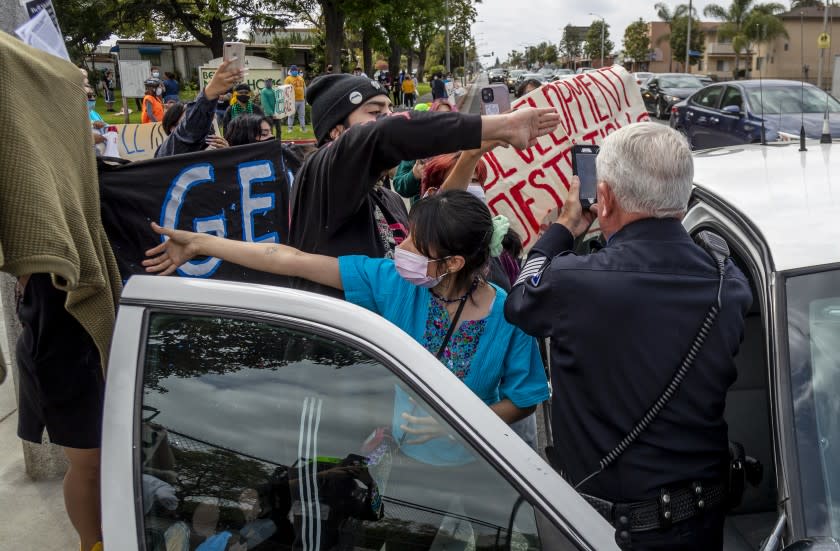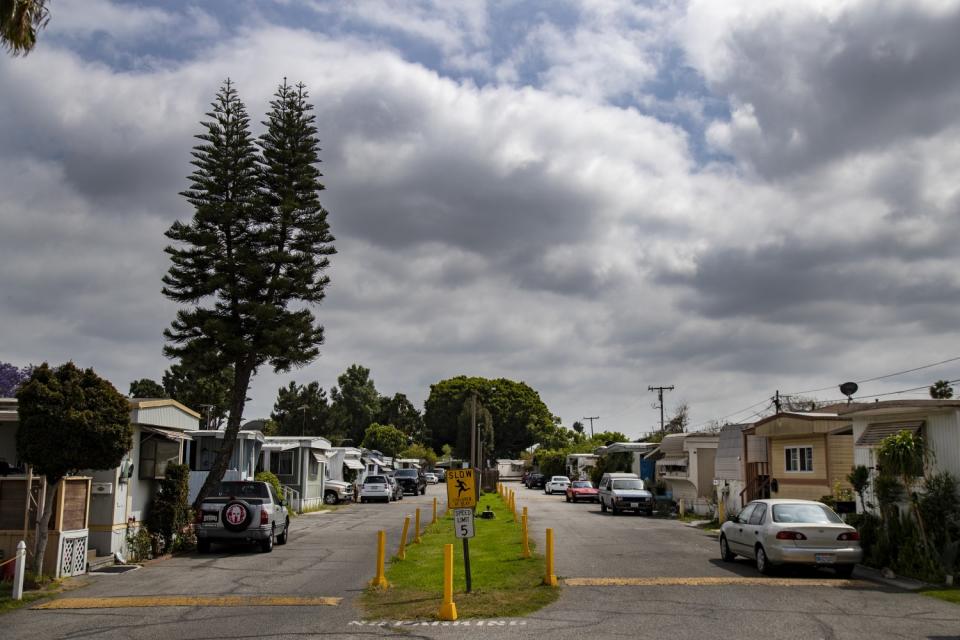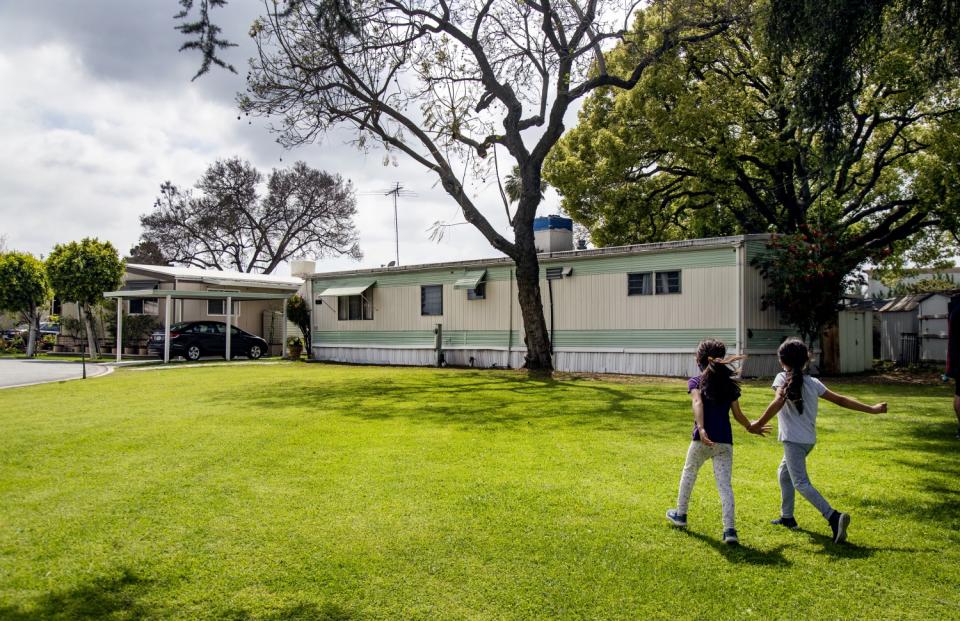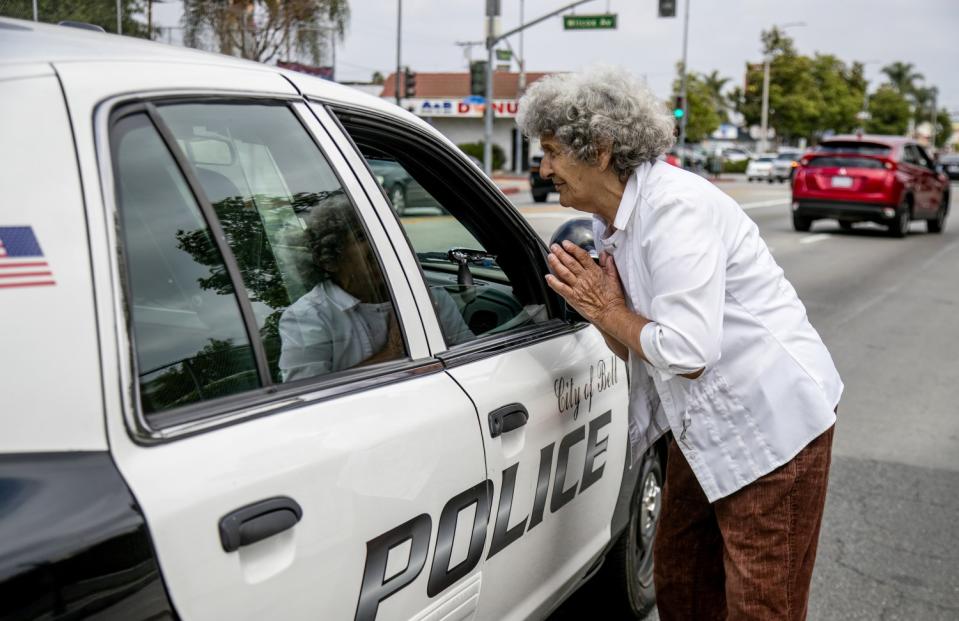Column: A city known for its corruption scandal is now in a fight over mobile home parks

Merli Albizures gripped a megaphone in late April, looked at the 80-plus people in front of her at Biancini Park in Bell, and felt a jolt of déjà vu.
In 2010, she had joined other residents in the small, working-class town to revolt against officials and politicians that bled city coffers dry. There were rallies and speeches and a recall that ousted most of the City Council and brought stability and a sense of hope for better days.
The scandal inspired community activists nationwide to feel that they, too, had a chance to take down entrenched politicos. Albizures remains proud of what she and her neighbors did back then — which was why she joined them on a windy afternoon to do it all over again.
“2010 continues,” the 46-year-old Guatemalan immigrant told me, as she turned on the megaphone and took a breath. “¡El pueblo primero!” Albizures yelled, as the crowd cheered. “¡El pueblo manda, señores!”
The people first. The people rule, ladies and gentleman.
Residents are grumbling again in Bell. This time, though, they say the roles are reversed from a decade ago. They claim city officials are painting them as a threat to Bell’s financial future.

At issue are the Bell and Florence Village mobile home parks, two city-owned properties with 259 owner-occupied units that stand on leased spaces. Bell bought them in 1995 to try and bulk up on affordable housing. Now, city leaders are looking for a way out.
During a December City Council meeting held over Zoom two days before Christmas, a staff report offered a bleak assessment of the situation. The city was still paying off a $20.8-million bond it took out for the mobile home parks in 2005. California’s closure of redevelopment agencies in 2012 put a permanent dent in city finances, which worsened last year because of COVID-19. More and more mobile park residents weren’t paying their rent, and City Atty. David Aleshire told councilmembers he doubted they ever would because they were “very aggressive” to code enforcement in the past.
The report offered three options forward, per a PowerPoint presentation: Dip into city reserves to save the mobile home parks, but put its “ability to provide to its 39,000 residents in greater peril.” Raise rents — they currently range from $330 to $800 per month — by 135%, even though California law currently allows only a 5% annual increase. Sell off the mobile home parks altogether.
The City Council is leaning toward the last option, but hasn't yet made a final decision.
"The Council is sensitive to the concerns of the residents, and we want to find a long-term solution that provides protection to the residents" whatever the future may bring, Councilmember Ali Saleh said via email. He was part of the reform slate that swept into office. "We hope that the residents understand that this is a process, and that they have a role to play in the process if they choose to participate."
They are participating — with protests.
They’ve created blistering memes on social media and blasted Saleh and his colleagues during council meetings. To raise funds for the neediest among them, rallies have sold T-shirts, masks and even churros.
“None of us have an idea of what’s next,” said 53-year-old Antonio Robles. He wore a T-shirt with the name and logo of "The New Dawn of Bell City," a group formed by mobile home residents to fight for their trailers and even explore a bid to buy the parks outright. “To start anew? Where would we go?”
“How is it that they want to throw us away like trash?” said 43-year-old Miriam Arista, who has lived in Florence Village for over 20 years. “[Councilmembers] have their own homes — how about us?”
“They want to send us a la fregada [to hell],” said 66-year-old Enrique Perez Gonzalez, who showed up to the rally even though he’s undergoing chemotherapy. “May they not be bad like the ones in 2010.”
Albizures, accompanied by a son and daughter, traded off the megaphone with other activists. She has lived in Bell Mobile Home Park for 23 years. “I like to do justice,” she said, “and I want them to treat us with justice.”
Activists gathered around 1 p.m. on the corner of Gage and Atlantic avenues to plan an afternoon of people-power theater. A rally at the busy intersection. A march down Gage for about a mile to the Bell Mobile Home Gardens. And the grand finale: a picnic complete with speeches, eloteros, and a kid-friendly punk band.

Attendees touched up banners made from canvas cloth that read “Bell Not 4 Sale,” “Dare to Struggle Dare to Win,” and “Antes Muertxs Que Vendidxs” (“Better Dead than a Sellout”). They passed out pamphlets with information and suggested chants — smartest one was “No More SELAouts,” a play on the acronym for southeast Los Angeles.
"This City Council is using the fact that they’re not the ones from 2010 to do what they want,” said Pepe Perez of SELA Chisme, a coalition of anti-gentrification activists. "That’s why the people are out there today. We know our history.”
“It’s so stupid to remove us,” said Isaac Albizures, Merli’s 20-year-old son. “ Man, even homeowners aren’t safe in this city anymore.”
After a couple of speeches and a short occupation of each street corner, rallygoers took over the eastbound lane of Gage and walked toward Bell Mobile Home Park. Even though they gnarled traffic for about half an hour, no commuters seemed to mind. Many honked in support, as if letting muscle memory take over.
The march ended at the driveway of Bell Mobile Home Park, an oasis of trees and lawn in the middle of a row of used-car dealerships and medical clinics. The abodes looked worn but cared for. Plants hung from porches. Children ran around.

Rallygoers were just getting comfortable here when two police cars swept in with lights flashing. Three officers emerged and didn’t flinch as protestors shouted “Pigs Go Home!” and other, less polite things. One took a quick lap around the driveway, told Albizures to make sure no one crossed the street for their own safety, went back inside his car, then took off. That officer returned 15 minutes later, now armed with a smartphone with which he silently filmed the crowd.
The atmosphere became even more heated than before. Some activists blocked his view with a banner; others slapped the trunk and side of the car as it sped off. Suddenly, 82-year-old Hilda Rodriguez chased after it until it slowed down. She yelled something at the officer, offered him the sign of the cross, then blew a kiss.
I asked what she told him. “I’m Republican, so I think the protesters can be kinder to the police,” she said in Cuban-accented Spanish. “But I told the police to let them protest! Let them be. I don't live here, but I can't imagine how I'd feel if I was told I had to leave my house."
She thought about it for a bit. "Yeah, I'd be angry, too."
This story originally appeared in Los Angeles Times.

